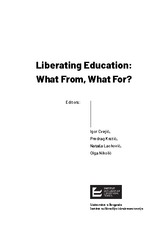Emancipatory and Ideological Functions of Education
Поглавље у монографији (Објављена верзија)
Метаподаци
Приказ свих података о документуАпстракт
The paper examines two conflicting societal functions of education: on the one hand, education can work to reproduce the existing power relations, indoctrinate students, and assimilate them into the existing social order, but on the other hand, it can also contribute to the emancipation of students and the society as a whole. By contrasting the emancipatory function with the ideological one, I aim to clarify the meaning of individual and social emancipation drawing on the Enlightenment tradition, locate the main ideological forces opposing it in the field of education, as well as suggest some ways in which they can be resisted.
First, I will explore the core emancipatory educational ideas of the Enlightenment based on three key texts: Rousseau’s Emile, Kant’s “What is Enlightenment?” and Freire’s Pedagogy of the Oppressed. Next, I will examine the ideological function of education, in particular of neoliberal education, in order to discern the main ways in which contemporary ideolog...y works through education. Based on insights gained, I will suggest several main lines of resistance, capable of strengthening the emancipatory function of education and countering the ideological one in contemporary neoliberal societies.
In the concluding discussion, I will respond to the critics arguing that the Enlightenment ideal had itself become ideological and had instrumentalized education (Biesta 2008; Osberg & Biesta 2020), which will lead me to make a conceptual distinction between ideology and ideal.
Кључне речи:
education / emancipation / ideology / ideal / enlightenment / neoliberalismИзвор:
Liberating Education: What From, What For?, 2021Издавач:
- Beograd : Institut za filozofiju i društvenu teoriju
Финансирање / пројекти:
- Министарство науке, технолошког развоја и иновација Републике Србије, институционално финансирање - 200025 (Универзитет у Београду, Институт за филозофију и друштвену теорију) (RS-MESTD-inst-2020-200025)
Колекције
Институција/група
IFDTTY - CHAP AU - Nikolić, Olga PY - 2021 UR - http://rifdt.instifdt.bg.ac.rs/123456789/2518 AB - The paper examines two conflicting societal functions of education: on the one hand, education can work to reproduce the existing power relations, indoctrinate students, and assimilate them into the existing social order, but on the other hand, it can also contribute to the emancipation of students and the society as a whole. By contrasting the emancipatory function with the ideological one, I aim to clarify the meaning of individual and social emancipation drawing on the Enlightenment tradition, locate the main ideological forces opposing it in the field of education, as well as suggest some ways in which they can be resisted. First, I will explore the core emancipatory educational ideas of the Enlightenment based on three key texts: Rousseau’s Emile, Kant’s “What is Enlightenment?” and Freire’s Pedagogy of the Oppressed. Next, I will examine the ideological function of education, in particular of neoliberal education, in order to discern the main ways in which contemporary ideology works through education. Based on insights gained, I will suggest several main lines of resistance, capable of strengthening the emancipatory function of education and countering the ideological one in contemporary neoliberal societies. In the concluding discussion, I will respond to the critics arguing that the Enlightenment ideal had itself become ideological and had instrumentalized education (Biesta 2008; Osberg & Biesta 2020), which will lead me to make a conceptual distinction between ideology and ideal. PB - Beograd : Institut za filozofiju i društvenu teoriju T2 - Liberating Education: What From, What For? T1 - Emancipatory and Ideological Functions of Education UR - https://hdl.handle.net/21.15107/rcub_rifdt_2518 ER -
@inbook{
author = "Nikolić, Olga",
year = "2021",
abstract = "The paper examines two conflicting societal functions of education: on the one hand, education can work to reproduce the existing power relations, indoctrinate students, and assimilate them into the existing social order, but on the other hand, it can also contribute to the emancipation of students and the society as a whole. By contrasting the emancipatory function with the ideological one, I aim to clarify the meaning of individual and social emancipation drawing on the Enlightenment tradition, locate the main ideological forces opposing it in the field of education, as well as suggest some ways in which they can be resisted.
First, I will explore the core emancipatory educational ideas of the Enlightenment based on three key texts: Rousseau’s Emile, Kant’s “What is Enlightenment?” and Freire’s Pedagogy of the Oppressed. Next, I will examine the ideological function of education, in particular of neoliberal education, in order to discern the main ways in which contemporary ideology works through education. Based on insights gained, I will suggest several main lines of resistance, capable of strengthening the emancipatory function of education and countering the ideological one in contemporary neoliberal societies.
In the concluding discussion, I will respond to the critics arguing that the Enlightenment ideal had itself become ideological and had instrumentalized education (Biesta 2008; Osberg & Biesta 2020), which will lead me to make a conceptual distinction between ideology and ideal.",
publisher = "Beograd : Institut za filozofiju i društvenu teoriju",
journal = "Liberating Education: What From, What For?",
booktitle = "Emancipatory and Ideological Functions of Education",
url = "https://hdl.handle.net/21.15107/rcub_rifdt_2518"
}
Nikolić, O.. (2021). Emancipatory and Ideological Functions of Education. in Liberating Education: What From, What For? Beograd : Institut za filozofiju i društvenu teoriju.. https://hdl.handle.net/21.15107/rcub_rifdt_2518
Nikolić O. Emancipatory and Ideological Functions of Education. in Liberating Education: What From, What For?. 2021;. https://hdl.handle.net/21.15107/rcub_rifdt_2518 .
Nikolić, Olga, "Emancipatory and Ideological Functions of Education" in Liberating Education: What From, What For? (2021), https://hdl.handle.net/21.15107/rcub_rifdt_2518 .



